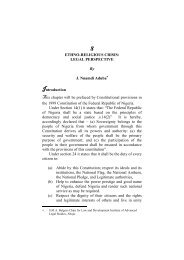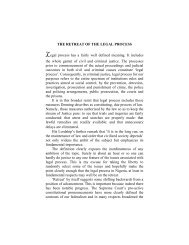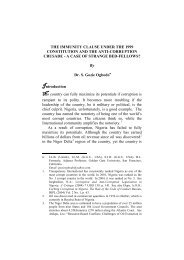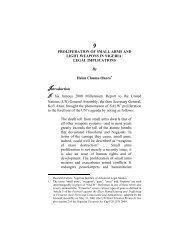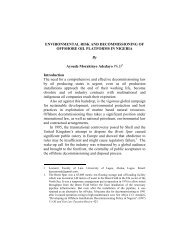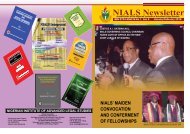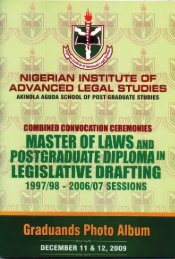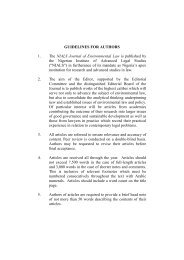DEVELOPMENT OF PLEA BARGAINING IN THE ADMINISTRATION ...
DEVELOPMENT OF PLEA BARGAINING IN THE ADMINISTRATION ...
DEVELOPMENT OF PLEA BARGAINING IN THE ADMINISTRATION ...
You also want an ePaper? Increase the reach of your titles
YUMPU automatically turns print PDFs into web optimized ePapers that Google loves.
50<br />
NIALS Journal of Law and Development<br />
There is something puzzling about the polarity of<br />
contemporary reactions to this practice. Most legal scholars<br />
oppose plea bargaining, finding it both inefficient and<br />
unjust. 2 Nevertheless, most participants in the plea bargaining<br />
process find the practice as a panacea in the administration of<br />
criminal justice. In an epoch where the practice of plea<br />
bargain has come under opprobrium, especially in relation to<br />
the anti-corruption fight, it is only apt to engage in an<br />
exercise of self-flagellation and make a few<br />
recommendations for that will impact on criminal justice<br />
administration. 3<br />
The Concept of Plea Bargaining<br />
Practitioners and Scholars are not agreed on the exact<br />
meaning of plea bargaining. Like the proverbial elephant that<br />
was subject of description by various blind men, plea<br />
bargaining can be described in diverse ways depending on<br />
the perception of each practitioner or scholar. There is no<br />
doubt that the practice of plea bargain is rooted in common<br />
law, from the Medieval English Common Law court of guilty<br />
pardons to accomplices in felony cases. In modern times<br />
however, the significance it has acquired and the popularity it<br />
has gained can be traced to the United States of America. 4<br />
No standard definition of plea-bargaining exists among<br />
practitioners. The definition of “plea bargaining” varies<br />
depending on the jurisdiction and on the context of its use. 5<br />
However, to understand the core problems of plea<br />
bargaining, it is quite necessary that we must first settle on<br />
2. Ibid. See footnote 4 where the learned authors said the most influential<br />
(and prolific) critics are Albert Alschuler and Stephen Schulhofer, both<br />
Professors at the University of Chicago.<br />
3. Alubo A.O.: “Plea Bargain and the Anti-Corruption Crusade in Nigeria”,<br />
University of Jos Law Journal, Vol. 8, No 2, September, 2009 at p. 1.<br />
4. See generally Olin, D. “Plea Bargain”<br />
available@http://www.truthinjustice.org accessed on August 12, 2010.<br />
5. See Miller, H.S.: et. al, “Plea Bargaining in the United States” at 1-15.



